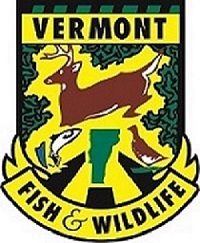
The deadline to apply for a 2022 Vermont moose hunting permit is June 22.
Moose permit applications are available on the Vermont Fish and Wildlife Department’s website www.vtfishandwildlife.com for the hunt limited to Vermont’s Wildlife Management Unit (WMU) E in the northeastern corner of the state.
The Vermont Fish and Wildlife Board voted on April 6 to have 60 either-sex moose hunting permits and 40 antlerless moose hunting permits available this year for a hunt limited to Vermont’s Wildlife Management Unit (WMU) E in the northeastern corner of the state. The science-based hunt will result in an estimated harvest of 51 to 65 moose, or 5 percent of the more than 1,000 moose currently estimated to live in WMU E.
“Moose density in WMU E remains well above one moose per square mile, significantly higher than any other part of the state,” said Nick Fortin, Vermont Fish and Wildlife’s biologist in charge of the moose project. “Moose densities greater than one per square mile support high numbers of winter ticks which negatively impact moose health and survival.”
The Fish and Wildlife Department recently partnered with University of Vermont researchers to conduct a study of moose health and survival in WMU E. The results of this study, in which 126 moose (36 cows, 90 calves) were fitted with GPS tracking collars, clearly showed that chronic high winter tick loads have caused the health of moose in that part of the state to be very poor. Survival of adult moose remained relatively good, but birth rates were very low and less than half of the calves survived their first winter.
The goal of the Fish and Wildlife Department’s 2022 moose season recommendation is to improve the health of moose in WMU-E by reducing the impact of winter ticks.
“Research has shown that lower moose densities, like in the rest of Vermont, support relatively few winter ticks that do not impact moose populations,” said Fortin. “Reducing moose density decreases the number of available hosts which in turn decreases the number of winter ticks on the landscape.”
“These permits will help address winter tick impacts on moose in WMU-E by reducing the density of moose, but it does so slowly, over a period of several years,” added Fortin. “This allows future moose permit allocations to be adjusted as new information becomes available. Given the poor health of the moose population in that area and a clearly identified cause, we need to take action to address this issue. Without intervention to reduce the moose population in WMU-E, high tick loads will continue to impact the health of moose in that region for many years.”
Lottery applications for hunting permits are $10 for residents and $25 for nonresidents. The deadline to apply is June 22. Winners of the permit lottery will purchase resident hunting permits for $100 and nonresident hunting permits for $350.
Hunters who held a permit within the past five years are not eligible to apply for a permit or to buy a bonus point. Applicants must continue to annually submit a moose permit application if they wish to retain their past bonus permits and accumulate subsequent bonus points.
Five permits will be available to Vermont military veterans, three permits will be available for “Special Opportunity” recipients with life-threatening illnesses, and three permits will be auctioned in accordance with regulations.
A drawing for permit winners is scheduled for Wednesday, July 20.
The 2022 Moose Season Recommendation and related information about moose research and management are available on Vermont Fish and Wildlife’s website at www.vtfishandwildlife.com.
